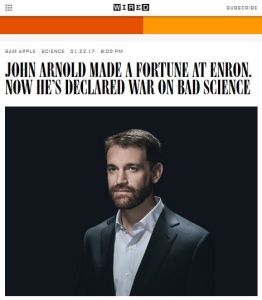
Sam Apple
John Arnold Made a Fortune at Enron. Now He’s Declared War on Bad Science
Wired, 2017
What's inside?
Why does billionaire John Arnold put his philanthropy dollars toward advocating for scientific integrity?
Recommendation
The beauty of science is that it’s transparent and reproducible. At least, that’s how it’s supposed to work. But according to the Reproducibility Project, only 40% of published study results can be replicated. Today’s science also overemphasizes positive results: Equally relevant insights that you can glean from failed experiments will never make any headlines. Billionaire John Arnold is out to reduce scientific bias using the same healthy respect for data that made him millions of dollars at Enron. getAbstract recommends this summary to scientists and science aficionados.
Take-Aways
- John Arnold was a billionaire at age 33. He retired at 38, deciding to dedicate the rest of his life to philanthropy.
- Arnold and his wife Laura created the Arnold Foundation but realized that it was hard to locate the most effective charities, because most charities don’t publish all their data.
- The Arnolds found that many fields, including psychology, nutrition and pharmacology, prioritize novel and compelling research results while discarding dull but important data.
- The Arnold Foundation seeks out researchers who conduct metaresearch, reproduce past studies and create research databases.
- The Arnold Foundation has donated more than $80 million to initiatives that champion scientific integrity.
Summary
As a futures trader, John Arnold brought Enron $750 million in 2001, even as the company was in its death throes. After Enron's bankruptcy, he left with an $8 million bonus and a clear name. He started his own hedge fund and became a billionaire at age 33. At 38, he quit to focus on philanthropy, starting the Laura and John Arnold Foundation with his wife Laura, a former oil executive.
“John Arnold “has said that the first phase of his life was ‘100% trying to make money’ and that it’s now ‘100% trying to do good’.”
Their original goal was “to simply locate the most effective organizations and write them checks.” But when they analyzed data, those organizations proved harder to locate than initially thought. Many nonprofit employees used science to proof their success, but upon closer inspection, their methodologies were flawed. Around this time, Arnold listened to a podcast about the US dietary guidelines. He learned that experts had based the dietary guidelines on questionable studies. They continued to ignore data that contradicted the desired results – and the fact that since the inception of the guidelines, obesity and diabetes had spiked. Arnold immediately wrote an email to Gary Taubes, the science journalist featured on the podcast. He has since pledged more than $40 million to the Nutrition Science Initiative, which Taubes co-founded to foster fundamental research on diet and health.
“If [Laura and John Arnold] wanted to embark on truly ‘transformational change,’ as their foundation literature states, it wouldn’t be enough to properly evaluate this or that education or criminal justice program. They would also have to take on a far more ambitious project: The Arnolds would have to try and fix science itself.”
The Arnolds became convinced that the problem they needed to solve was the system that brought novel and exciting – though unreliable – research results to the forefront while burying less compelling but equally important studies. Thus began the Arnold Foundation’s Research Integrity Initiative.
Researcher Brian Nosek received more than $15 million for his Reproducibility Project, which has found that the results of 60% of published psychology papers weren’t reproducible. John Ioannidis and Steve Goodman received an initial grant of $6 million for a metaresearch initiative at Stanford University. Ben Goldacre, Britain’s famous critic of pharmaceutical trials, has received multiple grants to build a database of information on global clinical trials. The Arnolds may not succeed in altering a scientific system and culture that produces misleading research, but the Arnold Foundation’s research integrity projects already seem to have increased awareness: According to an online survey, more than 50% of researchers conceded that science is in a reproducibility crisis.
About the Author
Sam Apple writes for Wired and teaches science writing at the University of Pennsylvania.
This document is restricted to personal use only.
My Highlights
Did you like this summary?
Read the articleThis summary has been shared with you by getAbstract.
We find, rate and summarize relevant knowledge to help people make better decisions in business and in their private lives.
Already a customer? Log in here.

















Comment on this summary